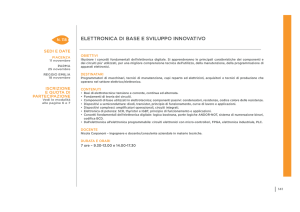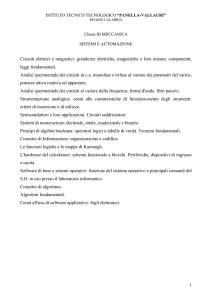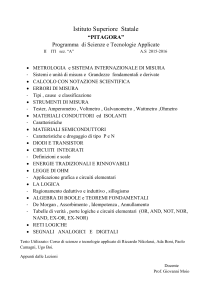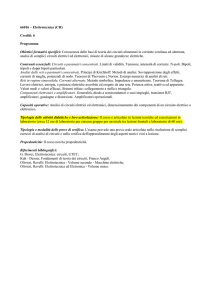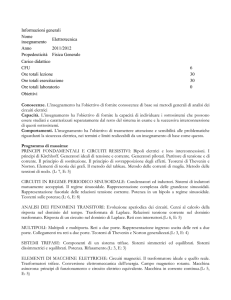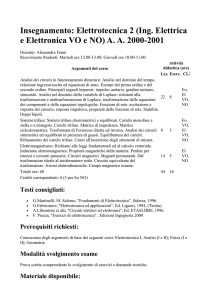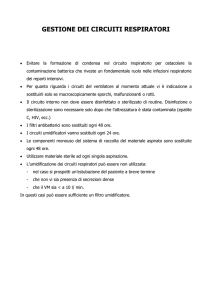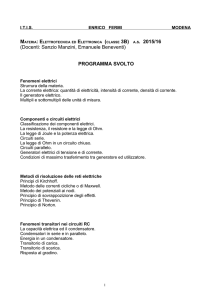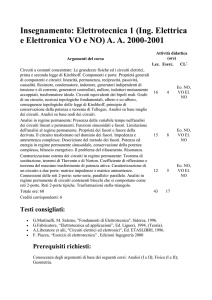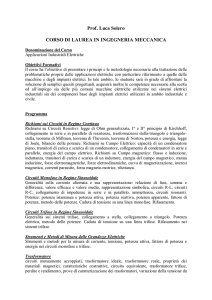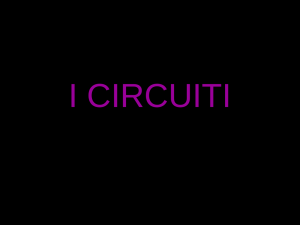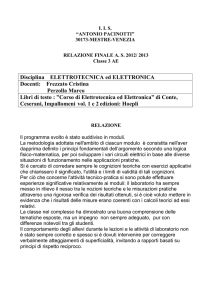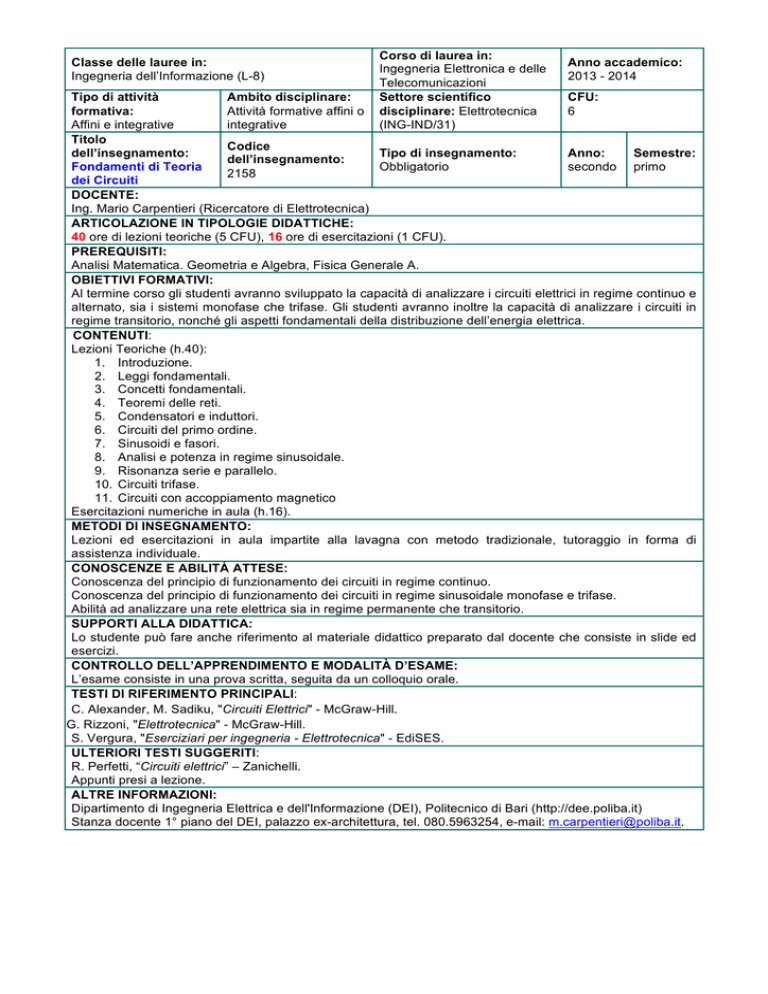
Classe delle lauree in:
Ingegneria dell’Informazione (L-8)
Corso di laurea in:
Ingegneria Elettronica e delle
Telecomunicazioni
Settore scientifico
disciplinare: Elettrotecnica
(ING-IND/31)
Anno accademico:
2013 - 2014
Tipo di attività
Ambito disciplinare:
CFU:
formativa:
Attività formative affini o
6
Affini e integrative
integrative
Titolo
Codice
dell’insegnamento:
Tipo di insegnamento:
Anno:
Semestre:
dell’insegnamento:
Fondamenti di Teoria
Obbligatorio
secondo primo
2158
dei Circuiti
DOCENTE:
Ing. Mario Carpentieri (Ricercatore di Elettrotecnica)
ARTICOLAZIONE IN TIPOLOGIE DIDATTICHE:
40 ore di lezioni teoriche (5 CFU), 16 ore di esercitazioni (1 CFU).
PREREQUISITI:
Analisi Matematica. Geometria e Algebra, Fisica Generale A.
OBIETTIVI FORMATIVI:
Al termine corso gli studenti avranno sviluppato la capacità di analizzare i circuiti elettrici in regime continuo e
alternato, sia i sistemi monofase che trifase. Gli studenti avranno inoltre la capacità di analizzare i circuiti in
regime transitorio, nonché gli aspetti fondamentali della distribuzione dell’energia elettrica.
CONTENUTI:
Lezioni Teoriche (h.40):
1. Introduzione.
2. Leggi fondamentali.
3. Concetti fondamentali.
4. Teoremi delle reti.
5. Condensatori e induttori.
6. Circuiti del primo ordine.
7. Sinusoidi e fasori.
8. Analisi e potenza in regime sinusoidale.
9. Risonanza serie e parallelo.
10. Circuiti trifase.
11. Circuiti con accoppiamento magnetico
Esercitazioni numeriche in aula (h.16).
METODI DI INSEGNAMENTO:
Lezioni ed esercitazioni in aula impartite alla lavagna con metodo tradizionale, tutoraggio in forma di
assistenza individuale.
CONOSCENZE E ABILITÀ ATTESE:
Conoscenza del principio di funzionamento dei circuiti in regime continuo.
Conoscenza del principio di funzionamento dei circuiti in regime sinusoidale monofase e trifase.
Abilità ad analizzare una rete elettrica sia in regime permanente che transitorio.
SUPPORTI ALLA DIDATTICA:
Lo studente può fare anche riferimento al materiale didattico preparato dal docente che consiste in slide ed
esercizi.
CONTROLLO DELL’APPRENDIMENTO E MODALITÀ D’ESAME:
L’esame consiste in una prova scritta, seguita da un colloquio orale.
TESTI DI RIFERIMENTO PRINCIPALI:
C. Alexander, M. Sadiku, "Circuiti Elettrici" - McGraw-Hill.
G. Rizzoni, "Elettrotecnica" - McGraw-Hill.
S. Vergura, "Eserciziari per ingegneria - Elettrotecnica" - EdiSES.
ULTERIORI TESTI SUGGERITI:
R. Perfetti, “Circuiti elettrici” – Zanichelli.
Appunti presi a lezione.
ALTRE INFORMAZIONI:
Dipartimento di Ingegneria Elettrica e dell'Informazione (DEI), Politecnico di Bari (http://dee.poliba.it)
Stanza docente 1° piano del DEI, palazzo ex-architettura, tel. 080.5963254, e-mail: [email protected].
Degree class:
Information Engineering
First level (three years)
degree:
Electronic and
Telecommunication
Engineering
Scientific Discipline Sector:
Electrotechnics (ING-IND/31)
Academic year:
2013 - 2014
Type of course
Disciplinary area:
ECTS Credits:
Correlated and
Training activities
6
additional
correlated or additional
Title of the course:
Code:
Type of course:
Year:
Semester:
Fundamentals of
nd
2158
Required
2 year
1st
circuit theory
LECTURER:
Ing. Mario Carpentieri (Assistant Professor of Electrotechnics)
HOURS OF INSTRUCTION:
Theory: 40 hours (5 ECTS). Numerical applications: 16 hours (1 ECTS).
PREREQUISITES:
Mathematical Analysis. Geometry and algebra. General Physics A.
AIMS:
At the end of the course students will be able to analyse both DC and AC circuits, either single or three phase
systems. Students will be able to analyse also the transitory regime and the critical aspects of the electrical
distribution.
CONTENTS:
1. Introduction.
2. Fundamental laws.
3. Fundamental principles.
4. Network theorems.
5. Capacitors and inductors.
6. First order circuits.
7. Alternate regime.
8. Analysis of AC regime and power.
9. Series and parallel resonance.
10. Three-phase circuits.
11. Circuits with magnetic coupling
Numerical exercises.
TEACHING METHODS:
Lectures given in the conventional manner, personalized feedback and coaching to improve every aspect of
the student work.
EXPECTED OUTCOME AND SKILLS:
At the end of the course students will be able to analyse both DC and AC circuits, either single or three phase
systems, and the critical aspects of the electrical distribution.
TEACHING AIDS:
Slides and exercises provided by the lecturer.
EXAMINATION METHOD:
A written examination followed by an oral examination.
BIBLIOGRAPHY:
C. Alexander, M. Sadiku, "Circuiti Elettrici" - McGraw-Hill.
G. Rizzoni, "Elettrotecnica" - McGraw-Hill.
S. Vergura, "Eserciziari per ingegneria - Elettrotecnica" - EdiSES.
FURTHER BIBLIOGRAPHY:
R. Perfetti, “Circuiti elettrici” – Zanichelli.
FURTHER INFORMATIONS:
Department of Electrical and Information Engineering (DEI), Politecnico di Bari (http://dee.poliba.it)
Lecturer room at 1st floor of DEI, phone 080.5963254, e-mail: [email protected].

